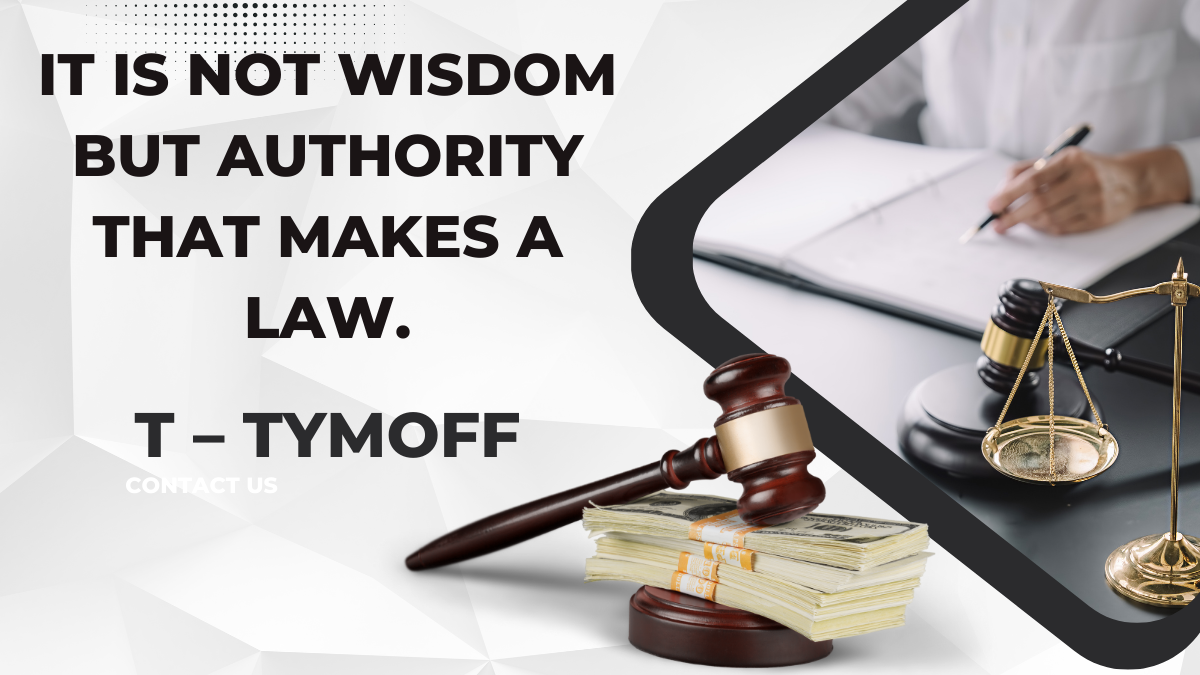LIFESTYLE
It is not wisdom but authority that makes a law. T – Tymoff

In the legal domain, we frequently consider the sources of its authority. Does it originate from something else entirely, or is it based on wisdom? T. Tymoff makes an interesting point when he says, “Authority, not wisdom, is what makes a law.” Let’s investigate this idea by delving into the nuances of authority and the law and how they interact to form our society.
Overview
Law influences everything in our lives, including the social structures that regulate society and how we conduct ourselves. According to T. Tymoff, authority—rather than wisdom—is the basis of legislation, which contradicts accepted wisdom. Together, we will explore this idea and gain an understanding of the relationships between authority and the law.
Recognizing Authority and Wisdom
Wisdom consists of judgment, experience, and knowledge. It displays the capacity to make defensible choices grounded in moral precepts and a thorough comprehension of human nature. However, authority refers to the ability or right to compel compliance. It is frequently granted to people or organizations because of their standing or the consensus of society.
The Law’s Nature
A governing body creates law as a set of rules and regulations to keep the peace and settle conflicts within a community. It embodies the standards, beliefs, and tenets that direct social relationships and behavior.
Legal Authority Sources
Legal authority comes from a number of places, such as customary practices, legislation, constitutional frameworks, and precedent. These sources give governing bodies authority and the right to enact and uphold laws.
Adherence to Society
Laws are only as effective as society compliance. Though common sense may affect people’s conformity to some standards, the perceived legitimacy of the law is what ultimately encourages mass conformity.
The Legal Systems’ Use of Wisdom
The influence of wisdom on laws and policies is significant, but it is mediated by power dynamics and institutional structures. Although decision-makers may use knowledge to guide their decisions, their authority bestows legal force onto their decisions.
Obstacles to Legal Power
Legal authority is not impervious to objections. The perceived validity of laws can be undermined by dissent, civil disobedience, and institutional resistance, which can result in social upheaval and legal reforms.
Historical Views
The interaction of authority and intelligence has shaped legal systems all around the world throughout history. The growth of legal systems, from the ancient Hammurabi codes to contemporary constitutional democracies, is a reflection of shifting ideas about legitimacy and authority.
Modern Consequences
The link between wisdom and authority is still changing in today’s complex society. As society values change and technology develops, governments struggle to balance conventional wisdom with new issues. The concepts of law and authority are used in a variety of situations in today’s interconnected world, from corporate governance to international politics. Comprehending these applications is essential for managing intricate legal matters.
Law’s Fundamentals
The power of law to control conduct in people and uphold social order is what makes it fundamental. It embodies the core ideas of equality, justice, and fairness.
The Significance of Authority
Legal systems rely on authority to provide the structure for governance and law enforcement. It preserves the rule of law and assures compliance.
Legal Wisdom
Laws are made and interpreted with knowledge, but their legal force comes from the authority placed in legal institutions. While wisdom does not determine the application of authority, it does support it.
The Impact of T. Tymoff
The assertion made by T. Tymoff calls into question accepted ideas about law and authority and forces us to reevaluate the origins and workings of legal power. It emphasizes how crucial it is to look at how knowledge and authority interact in government.
The Changing Legal Environment
Legal systems develop in tandem with societies. The legal system must constantly reflect on and adjust to changes in society values, technology breakthroughs, and cultural developments.
Dynamics of Authority and Power
Power dynamics and authority are closely related, and they both represent how power is distributed in society. It is crucial to comprehend these processes in order to guarantee legitimacy and accountability in government.
How Legal Interpretation Works
Determining the intent of the law is a difficult task that requires examining statutes, precedents, and constitutional requirements. Textualism, originalism, and purposivism are just a few of the interpretive approaches that judges and legal academics use to understand legal documents and clear up ambiguities. The way a legal interpretation is decided can have a significant impact on how laws evolve and how society changes.
Innovation and Reform in Law
Legal systems are dynamic; they change to meet the requirements of society, adapt to new technology, and reflect shifting cultural norms. Legal reform projects aim to improve access to justice for underprivileged people, expedite legal procedures, and address systematic inequalities. Furthermore, legal innovation is changing the way legal services are provided and increasing access to justice. Examples of this include online legal services and alternative dispute resolution procedures.
The Law’s Globalization
As the world grows more interconnected, the globalization of law has taken center stage in legal discourse. International law, treaties, and conventions transcend national borders and authorities to control transnational problems including trade, human rights, and environmental protection. The increasing interdependence of nations and the necessity for group action to address global issues are reflected in the harmonization of legal norms and the growth of international legal institutions.
Professional Responsibility and Legal Ethics
The practice of law is governed by professional standards and ethical requirements for legal professionals. Constant problems that need for careful thought and commitment to ethical standards include conflicts of interest, client confidentiality, and ethical difficulties. Maintaining the integrity and reputation of the legal profession and fostering public trust in the administration of justice depend on upholding legal ethics.
How Law and Society Intersect
Law is not an abstract idea; rather, it is a fundamental part of society, influencing institutions, actions, and social standards. Real-world repercussions of legal decisions affect people individually, in groups, and across entire countries. A multidisciplinary approach is necessary to comprehend the relationship between law and society. To examine the intricate dynamics of legal systems, insights from sociology, political science, economics, and other disciplines are drawn upon.
Empowerment and Legal Education
In order to effectively traverse the complexities of the legal system and defend their rights, people must have a solid legal education. Promoting legal literacy and guaranteeing equitable access to justice depend on having access to legal knowledge, resources, and educational opportunities. Societies can enable people to actively engage in democratic processes, protect the rule of law, and bring about constructive social change by cultivating a culture of legal empowerment.
Concluding Remarks
To sum up, T. Tymoff’s claim that “Authority, not wisdom, makes a law” challenges us to reconsider how we see legal frameworks. Laws have legal effect because of the authority placed in governing bodies, even though knowledge surely guides our moral compass. Studying law is a complex process that necessitates a thorough comprehension of legal processes, organizations, and principles. Through investigating the intricacies of legal frameworks, we can acquire a deeper understanding of the forces that dictate human behavior and mold the course of civilization. It is critical to have a comprehensive approach to legal research and decision-making, based on the values of justice, fairness, and equality, as we continue to wrestle with urgent legal difficulties and societal issues.
Frequently Asked Questions (FAQs)
Q1. Does wisdom not matter while making laws?
The ability to enforce laws is ultimately decided by legal authority, even though knowledge guides the decision-making process.
Q2. How do social norms affect the application of the law?
Perceptions of legitimacy are shaped by societal norms, which also affect the power of governing organizations to make and implement laws.
Q3. Is it possible to contest legal authority?
It is true that institutional resistance, civil disobedience, and dissent can all be used to subvert legal authority.
Q4. How do past decisions influence the authority of the law?
Legal authority is based on historical precedents, which also influence how legal systems change over time.
Q5. How does technology affect the relationships between authority and the law?
Lawmakers must adjust to the shifting demands and expectations of society as a result of the new opportunities and problems that technology presents to legal systems.
We can learn more about the workings of societal order and the intricacies of governance by investigating the relationship between wisdom and power in law. Examining the origins and ramifications of legal and social developments critically becomes more crucial as we navigate their constantly shifting environments.

LIFESTYLE
Choosing a Retirement Community: Essential Tips for a Fulfilling Retirement

Key Takeaways
- Consider your requirements and way of life when choosing a retirement community.
- Consider factors like healthcare services, amenities, and social opportunities.
- Visiting potential communities can help make an informed decision.
Table of Contents
- Understand Your Needs
- Evaluate Healthcare Services
- Assess Amenities and Activities
- Financial Considerations
- Tour the Community
- Ask Questions: A Checklist
- Talk to Current Residents
- Make Your Decision
Understand Your Needs
Consider what aspects of your current lifestyle you want to maintain and any new activities you wish to pursue. Understanding your priorities is essential for making an informed decision, whether you’re looking for independent living or assisted living in Orlando. Think about your daily routine, hobbies, and social interactions you enjoy. Do you plan to stay physically active with fitness classes or prefer tranquil settings for reading and meditation? Are you seeking a community that strongly emphasizes social connections or offers a more private lifestyle? Reflecting on these questions will help you find a community that aligns with your aspirations for retirement and enhances your quality of life.
Evaluate Healthcare Services
Ensuring that a retirement community offers comprehensive healthcare services is vital. These services include on-site medical care, emergency response systems, and partnerships with nearby hospitals. The demand for quality healthcare in retirement communities has been rising steadily, making this factor non-negotiable for many seniors and their families.
Many communities provide varying levels of care, from essential health monitoring to advanced medical support.
Assess Amenities and Activities
Retirement should be a time of enjoyment and exploration. Look for communities with various amenities and activities that align with your interests. The right amenities, from fitness centers to cultural events, can significantly enhance your retirement experience.
Fitness and Wellness Programs
Many retirement communities offer fitness and wellness programs to help residents stay active and healthy. These include swimming pools, gym facilities, and yoga classes. These programs can improve physical health, mental well-being, and happiness.
Social and Cultural Events
Social and cultural events can enrich your retirement life, offering opportunities to meet new people and develop new skills. Look for communities that host regular events, such as art classes, music performances, and group excursions. These activities provide a stimulating environment and a sense of community, which is vital for a fulfilling retirement.
Financial Considerations
Financial planning is crucial when selecting a retirement community. Research the costs associated with different communities and understand what is included in the fees. Transparency regarding financial obligations can prevent future surprises and help you manage your finances effectively. For more information on managing your finances in retirement, you can visit AARP’s financial planning resources. They offer comprehensive advice on budgeting, investing, and planning for the future, ensuring you make informed and financially sound decisions.
Tour the Community
Before making any decisions, it’s crucial to tour several communities to get a firsthand feel of the environment. Pay attention to the facilities’ condition, the staff’s friendliness, and the overall atmosphere. Observing day-to-day operations and interactions within the community will provide insights that brochures and websites may not reveal. Take notes during your visits and compare them later to help with your decision-making process. This firsthand experience can help you determine each community’s level of care, cleanliness, and ambiance, making it easier to choose a place where you’ll feel comfortable and happy.
Ask Questions: A Checklist
- What healthcare services are available?
- What activities and amenities are offered?
- What are the costs, and what are they included?
- What is the staff-to-resident ratio?
- Are there any additional fees for services?
Feel free to ask specific questions about daily life, medical care, emergency procedures, and community policies. It will give you a clearer picture of what to expect and ensure all your concerns are addressed.
Talk to Current Residents
Interacting with current residents can provide valuable insights into daily life in the community. Their experiences highlight the positives and potential drawbacks you have yet to consider. Engaging in conversations with residents allows you to hear firsthand about their satisfaction with the services, staff, and overall atmosphere of the community.
Make Your Decision
After thorough research and consideration, it’s time to make your decision. Choose the community that best matches your needs, preferences, and budget. A well-chosen retirement community can provide a satisfying and enriching experience for years, ensuring that your retirement years are filled with joy, security, and peace of mind.
LIFESTYLE
Secrets Revealed: How to Choose the Perfect Private Event Venue for Your Celebration

Before searching for the ideal venue, it’s essential to understand what your event requires. This means specifying the type of event—whether it’s a wedding, corporate meeting, birthday party, or family reunion. Estimating the number of guests and clarifying the atmosphere or theme you want to create is vital. Are you thinking of a formal setting with a specific seating arrangement? Or perhaps a casual, more relaxed environment with plenty of mingling spaces? Defining these needs early will streamline your selection process, saving time and energy.
Consider the Location
The venue’s location is critical when planning your event, including searching for a private event venue in Mitchell, SD. It should be easily accessible for your guests, whether by car or public transportation. Consider the availability of parking spaces—sufficient parking can add a layer of convenience for your guests. Additionally, the venue should be situated in a safe and reputable area. The neighborhood can significantly affect the overall perception and experience of your event. If the location is suitable, it will ease the logistics for your guests and enhance their overall experience, making your event more memorable.
Evaluate the Capacity and Space
Choosing a venue that comfortably fits your guest list’s size is crucial. An overcrowded venue can feel stifling, making your guests uncomfortable. Conversely, an oversized venue can make the event feel empty and underwhelming. Review the venue’s capacity regulations to ensure you’re complying with any legal limitations. Assess the spatial layout to provide enough room for all activities, whether a dance floor, stage, or areas for dining and mingling. An excellent spatial arrangement ensures a smooth flow of movement, creating a comfortable atmosphere for all attendees.
Check the Amenities and Services
Modern venues often have various amenities that significantly elevate your event’s quality. Essential services to look out for include catering options, state-of-the-art audio-visual equipment, and reliable Wi-Fi. Some venues offer event planning services, which is a huge advantage. Professional assistance can iron out many logistical wrinkles, making the overall planning process more manageable. You must check what services are included in your venue rental fee.
Review the Venue’s Ambiance
The venue’s ambiance sets the tone for your event, making it a critical element. Each aspect contributes to the overall atmosphere, from architecture to interior design and decorations. Ensure that the venue’s style aligns with your event’s theme. For instance, a corporate event might benefit from a sleek, modern setting with advanced technological facilities. On the other hand, a wedding may require a more romantic, elegant atmosphere with beautiful floral arrangements and soft lighting. A personal visit can help you gauge the venue’s ambiance and ensure it meets your expectations.
Understand the Cost and Flexibility
Budget considerations are always at the forefront of mind when planning an event. It’s essential to compare different venues to understand what’s included in the rental cost. Some venues offer all-inclusive packages that cover various services such as catering, decoration, and audio-visual equipment. On the other hand, some venues may charge separately for each service. Understanding these cost structures will help you make an informed decision.
Read Reviews and Get Recommendations
Gathering reviews and testimonials from previous clients can offer valuable insights into a venue’s reputation and quality of service. Reading about other clients’ experiences can help you identify potential issues and set realistic expectations. Additionally, seeking recommendations from friends or colleagues who have hosted similar events can prove incredibly useful. Personal experiences often provide the most reliable insights into a venue’s capabilities.
Visit the Venue in Person
Once you’ve shortlisted potential venues, an in-person visit is essential. This lets you experience the venue’s ambiance firsthand, assess its cleanliness, and interact with the staff. An in-person visit also offers a valuable opportunity to visualize your event’s setup and address any questions or concerns with the venue management team. It assists in guaranteeing that the location will fulfill your needs and surpass your anticipations, enhancing the triumph and remembrance of your occasion.
LIFESTYLE
Proactive Measures for Protecting Your Home: Insight into Homeowners Insurance

A General Overview of Homeowners Insurance
Imagine your home facing unexpected damages from natural disasters, theft, or accidents. Such events can lead to significant financial setbacks, which is where homeowners insurance comes in as a vital tool. This form of insurance is designed as a multi-faceted product that includes coverage for your property, personal belongings, and potential liabilities. It acts as a shield, safeguarding one of your most valuable assets against various threats. For residents seeking to protect their homes, securing home insurance in FT Myers FL, with a policy that aligns with the specific perils of their area is essential. When considering such insurance, it’s not just about fulfilling a mortgage requirement; it’s all about having the peace of mind that comes with being ready for everything that may happen.
Coverage Types Featured in Homeowners Insurance Policies
Understanding the protections that homeowners insurance provides is imperative. A standard policy usually encompasses several categories of coverage. The principal component is dwelling coverage, which guards the structure of your home against common hazards like fires, storms, or unwanted intruders causing damage. Furthermore, it’s essential to know that additional living expenses coverage—also known as loss of use—can greatly assist in mitigating the cost of temporary housing and living expenses. At the same time, your home is being repaired or rebuilt. Exploring these different layers of protection allows homeowners to evaluate their policy needs effectively and ensure comprehensive coverage tailored to their home’s vulnerabilities.
The Role of Personal Property Protection
Your home is not just a structure; it’s a repository of your life’s collection. Items within your home can carry sentimental and monetary value, and protecting them is another fundamental aspect of homeowners insurance. Personal property coverage aims to reimburse you for repairing or replacing belongings, such as electronics, apparel, or jewelry, in the event of a covered loss, such as theft or fire. While policies often provide substantial coverage for personal property by default, homeowners must conduct an inventory and assess whether they need additional riders or endorsements to cover high-value items that exceed the standard policy limits.
Understanding Liability Coverage and Why It Matters
Liability coverage is often an overlooked but significant component of homeowners insurance. This coverage kicks in if you are judged legally liable for inflicting harm to another person or property damage. It can cover anything from a visitor’s medical bills stemming from an injury sustained on your property to legal fees and court awards within the coverage limits of your policy. It’s a comprehensive safeguard that protects your financial well-being and provides a buffer that can mitigate stress and uncertainty in litigious situations. Since incidents can occur without warning, robust liability coverage gives homeowners a much-needed safety net.
The Process of Filing a Claim: What to Expect
When confronting the aftermath of property damage or loss, knowing the steps to file a claim can expedite the process and help alleviate some of the stress. The key is in the details—begin by documenting the extent of the damage with video or photographic evidence. Compile lists of stolen or damaged items with their estimated values. Prompt notification of your insurance provider is essential, as is the precision completion of claim forms. Fundamentally, you should remain organized and keep lines of communication open with your insurance provider’s claims department.
Factors That Influence Your Home Insurance Premiums
The calculus behind insurance premiums may seem mysterious, but it is based on a range of factors deemed as risk indicators by insurance companies. The location of your home plays a significant role—properties in areas prone to wildfires, hurricanes, or other natural disasters might carry higher premiums due to the increased risk of claims. The construction materials of your home, safety features like alarms, and even your credit history are considered when insurers set your rates. It’s also valuable to understand how lifestyle choices, such as owning certain breeds of pets or having a trampoline, can affect your premiums. For an in-depth understanding, reports from sources offer a wealth of data and exemplify how these factors interplay in the insurance marketplace.
Top Tips for Choosing the Right Homeowners Insurance Policy
Last but not least, selecting the homeowner’s insurance plan that best suits your requirements is an important choice that needs to be made carefully and thoughtfully. Start by evaluating your property’s value and the worth of all personal assets housed within to determine the level of coverage necessary for adequate protection. Feel free to shop around, seek multiple quotes, and ask questions about policy specifics like deductibles, coverage limits, and potential discounts for combined policies or safety features. Understanding the terms and conditions of your policy ensures that when the time comes to make a claim, the process is as smooth and efficient as possible—ultimately affording you the peace of mind that your home and belongings are secure.
-

 ENTERTAINMENT5 months ago
ENTERTAINMENT5 months agoUnveiling the Life of Mary Joan Martelly: A Comprehensive Biography
-

 BUSINESS3 months ago
BUSINESS3 months agoSavvy Shopping Guide: Finding and Using Online Rebates & Offers Like a Pro
-

 ENTERTAINMENT5 months ago
ENTERTAINMENT5 months agoUnraveling the Mystery of Beth Grosshans Husband
-

 TECHNOLOGY5 months ago
TECHNOLOGY5 months agoTANZOHUB: REVOLUTIONIZING YOUR DIGITAL EXPERIENCE
-

 ENTERTAINMENT5 months ago
ENTERTAINMENT5 months agoExploring the Trailblazing Collaboration of Kase Abusharkh Amy Berry
-

 WORKING HOURS6 months ago
WORKING HOURS6 months agoUncovering the Enchantments of Wise.com
-

 ENTERTAINMENT5 months ago
ENTERTAINMENT5 months agoMary Marquardt – A Glimpse into Her Life and Career
-

 Blog5 months ago
Blog5 months agoWordhippo 5 Letter Words – Everything You Need to Know




